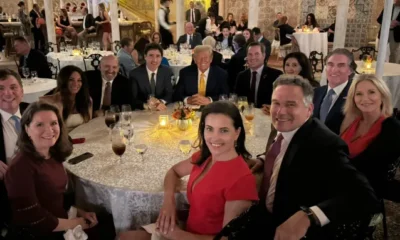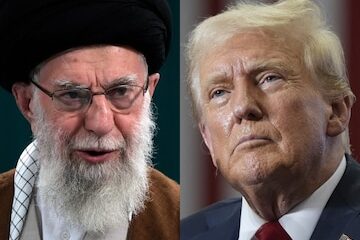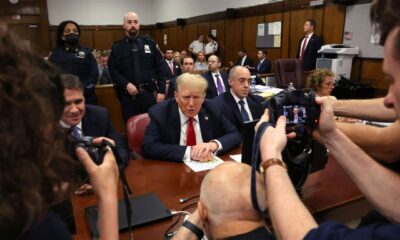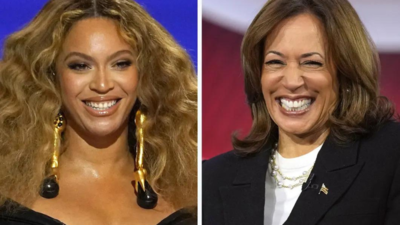NEWS
Breaking News: What Trump could do on day one in the White House…. See More
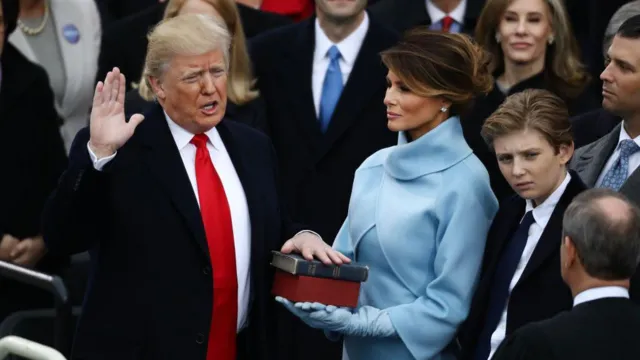
Donald Trump and his Republican Party have an ambitious agenda and (near) control of US Congress.
Trump has said he will “make heads spin” as he moves full-speed ahead after his inauguration on 20 January.
His team has said to expect a flurry of executive orders – directives from the US president – out of the Oval Office in the first week.
Policy experts and lawyers are already drafting those orders as part of the administration’s transition.
Still, advocacy groups and Democratic state governors have vowed to challenge at least some of those plans.
Here is what the president-elect has said about his second-term priorities.
Immigration and the border
Trump press secretary Karoline Leavitt told Fox News on Sunday “we know he promised to sign an executive order to secure the southern border”.
“We know that on day one he is going to launch the largest mass deportation of illegal immigrants in American history,” she said.
In the week since his re-election, Trump has prioritised filling leadership positions that would oversee immigration, suggesting he is preparing to tackle his plans for border policy early.
He tapped veteran immigration official Tom Homan as his “border tsar”; selected South Dakota Governor Kristi Noem to oversee homeland security; and appointed Steven Miller as White House deputy chief of staff for policy. Mr Miller is best known for shaping some Trump’s most restrictive policies on illegal immigration during his first term.
Any mass deportation programme could face logistical difficulties as well as a flurry of legal challenges from immigration and human rights activists.
Trump could also re-implement his “Remain in Mexico” policy that required asylum seekers to wait in Mexico while claims are processed.
President Joe Biden had called the programme “inhumane” and tried to end it on his first day in office, but faced legal challenges. In 2022, the Supreme Court allowed him to move ahead.
During the Trump administration, about 70,000 asylum seekers were returned to Mexico to wait for their hearings.
Another day one promise was to end birthright citizenship – the 150-year-old principle that says anyone born on US soil is an American citizen.
It’s not clear how Trump plans to achieve this policy. He has pledged an executive order but birthright citizenship is explicitly guaranteed by the US Constitution, meaning it can only be altered under specific circumstances.
He would need states to agree to a national convention or a two-thirds vote in favour in the narrowly split Congress to propose a change, then subsequent approval by three-fourths of state legislatures – of which Republicans control just over half.
Trump did not mention pardons in his victory speech, but he has long suggested that pardoning those convicted of storming the Capitol in 2021 would be a priority.
“Oh, absolutely, I would. If they’re innocent, I would pardon them,” Trump said during a panel at the National Association of Black Journalists.
US presidents have wide authority to forgive people convicted of federal crimes or end their prison sentences. Prosecutors may also decide to drop pending cases depending on who Trump might choose to pardon.
What’s less clear is who might get a pardon
At one point, Trump told CNN: “I am inclined to pardon many of them. I can’t say for every single one, because a couple of them, probably they got out of control.”
Ms Leavitt told the Washington Post that he will decide “on a case-by-case basis when he is back in the White House”.
More than 1,500 people were arrested in connection with the Capitol riot. According to federal numbers, more than 750 of them were sentenced for crimes ranging from trespassing to assaulting police officers and seditious conspiracy.
Jack Smith
Trump has also faced his own legal challenges over his actions following the 2020 election and a separate classified documents case.
Special Counsel Jack Smith, a veteran prosecutor appointed to oversee the US Department of Justice’s investigations into Trump, filed charges, to which the president-elect has pleaded not guilty.
Trump has said firing Jack Smith will be one of his top priorities.
“I would fire him within two seconds. He’ll be one of the first things addressed,” he said in an interview in October.
The case was already facing an uncertain future. The Supreme Court ruled in July that presidents have partial immunity from criminal prosecution for their conduct in office, undermining Mr Smith’s case.
Trump’s electoral win also gives him the power to pardon himself of any federal crimes, though no president has done so before.
The Department of Justice is reportedly in talks with Mr Smith over winding down the cases. It is unclear whether Trump might go further and punish Mr Smith.
Trump has regularly railed against the special counsel in interviews and online, calling him a “crooked person”, a “scoundrel” and other insults.

